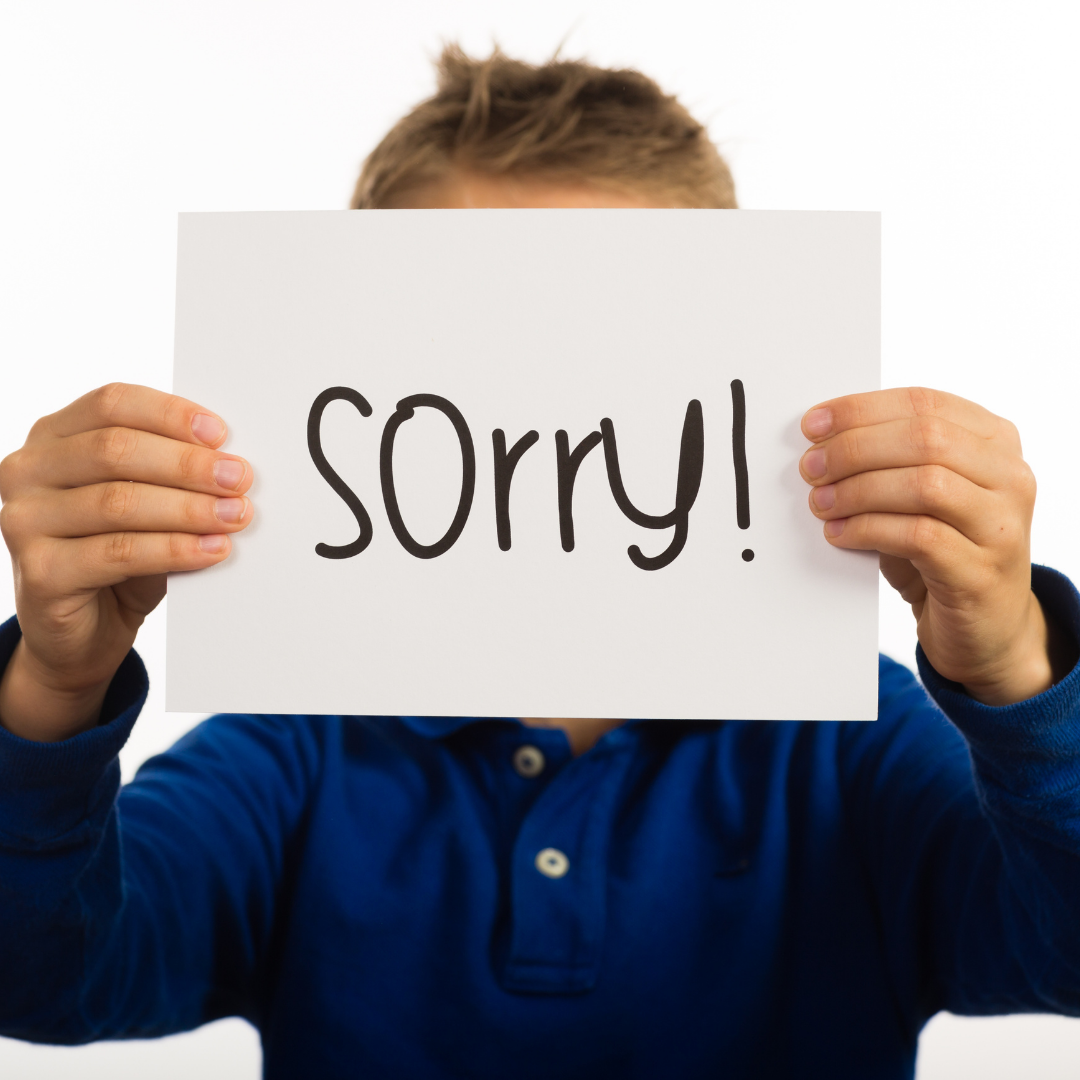Should we make our children say sorry?
By Claire Burgess, Family Consultant
The word sorry is often a word which is overused and not always in the correct context. An apology can mean a lot when you have been hurt, upset, annoyed etc and having someone acknowledge when they have done something wrong does often help to repair the situation. However, we do also have a very strong need for the apology to have meaning and sentiment – we don’t want to think that someone is just saying it for the sake of it or because they think that will get them out of the situation. If as adults we have a very strong sense of what a genuine apology feels like, then this is no different for our children.
Over the years of working with children and their families I have seen lots of examples where children behave in a manner which causes upset and the adult then expects the child to apologise. This often then becomes the battle ground with the child refusing to say sorry - this can be for many reasons such as not understanding what the word sorry actually means, why they have to say sorry for the action or behaviour, or because they have a sense that they are in the right and sorry is not something they feel they need to say. Whilst we need to make sure that our children understand which behaviours are and aren’t acceptable and that we don’t ignore inappropriate behaviour, we do need to understand that behaviours are what we can physically see; they are an outlet for the (inside) emotions that a child (or adult) might be feeling and experiencing at the time.
When looking at getting our children to say sorry we need to consider the following points:
We often request that our children say sorry as this is felt to be the ‘right thing to do’ but, depending on your child’s age, do they understand the meaning behind the word sorry and if so, why they are saying it? If they don’t then it becomes an empty word which they say because they learn that it is just something that adults ask you to do.
When a situation arises where you feel your child needs to apologise, focus on the situation rather than the child themselves. If we take an example: your child is upset with their sibling and they get physical (push, hit etc), you need to step in and use language which helps to diffuse the situation such as “I can see that you are really annoyed with your brother right now, but you can’t hit/push etc. You have hurt your brother and that is not ok.” You do need to make sure that you have the full story about the situation, so with older children, before jumping in with what you think or perceive to be the issue, calm the situation down and then ask for both sides of the story – allowing both parties (or more if that is the case) have their time to explain. This will help to make everyone feel heard and in turn calm down. When we (children and adults alike) feel heard and listened to we are going to be much more receptive to resolving things. It is then about working with the child/ren to resolve the situation, asking them how to make it better. This might be by making an apology and then moving on.
Avoid getting your child to say sorry in the heat of the moment. Often when your child’s lid has most likely ‘flipped’ (covered in ‘Your guide to Behaviour and Emotions’!), this is not going to going be effective. By getting your child to say sorry does not always mean that they understand why, but also can also create the mindset that they can do things such like hit or shout, say sorry and all is ok. We want to use these opportunities to teach children about their behaviours being acceptable or unacceptable, taking account for their actions and then responding appropriately. This might be in ways such as giving a toy back to another child that they have snatched, or they give you a hug to show that they understand that they have upset you through shouting at you for example. If these are responses which come naturally and from an understanding of their actions, this is going to be more impactful than a sorry which might not really be meant or ultimately understood! By taking time to explain why the behaviour was not acceptable and looking for other solutions, you will find that there will be times when your child says sorry without being prompted or asked, this is when you know that they truly understand the meaning to the word.
How your child says sorry is very often an issue for lots of adults. If the child does not say sorry in the way that we expect (looking at us directly and in a manner which is deemed ‘appropriate’...by adults) this can put a great deal of focus on the child which can lead to them experiencing feelings of embarrassment or shame (no one wants to feel those). In addition, as we know, children are attention needing, so if they are craving attention at the time and by not saying sorry in a way the adult would like, is going to get them more attention, they will continue to say it in a way to gain further attention. If it does become an issue and they feel uncomfortable due to other people being around (those feelings of shame or embarrassment again) then as a defence mechanism they will continue to refuse to say sorry or to say it in a way that is not with ‘meaning’. It will be your child’s fight, flight or freeze response kicking in! Remember, if your child is having to apologise due to a behaviour it is often due to the emotions that they are feeling which they are only just learning to gain control of. If they are feeling out of control in that moment, then they might not be ready to apologise, it can sometimes mean that it will come later and in some cases this can be hours later or potentially the next day.
By not getting a child to say sorry does not mean that they are ‘let off’ the behaviour as they do need to know what they have done is wrong and that it might not be kind etc. When putting in strategies which encourage your child to reflect on what they have done, how they have made the other child feel etc then you would hope that from this modelling the saying sorry will then come naturally to your child. This is a learning process (which takes us through to adulthood) and we need to help our children to learn about what it feels like to apologise but also to be apologised to. Being gracious in accepting an apology can be as greater skill as apologising.
Always apologise to your child where appropriate. Children learn their social responses and cues from the adults around them, if they can see that we are accountable for our actions and then respond appropriately they will follow and do the same. If you have forgotten something or got cross over something (remember we are all human so sometimes your emotions might take over!) then saying sorry to your child for this can be cathartic for you, but also models to your child that you sometimes make mistakes or emotions take over, but that you reflect on this and then respect them and their feelings by apologising.
Saying sorry does not always have to be followed up with a hug. When children say sorry (hopefully their own natural response) you don’t need to encourage them to give a hug as well. For some children this will all be too much for them in the situation, it might be that they would prefer to do a high five, a fist bump or a thumbs up or just to say sorry and move on. These are all ok, but only if this is what your child feels comfortable with. As mentioned before, if we force things on our children it can often lead to them pushing back and resisting. If we give options and solutions the child can feel more in control and happier to follow the action that they feel most comfortable with.
Don’t jump in too quickly with getting your child to apologise. If you can see a situation between your child and their friend or sibling, or if it is between you and your child take care not to jump in to take control of the situation and demand an apology. Sometimes by letting our children experience the situation and have the time to think they may surprise you and apologise without prompting!
Sorry is often seen as a very easy and simple word which we get our children to say in order to move on, but we need to consider the underlying emotions and learning opportunities from these situations. Saying sorry needs to be done with an understanding of ‘why?’ and ‘for what?’, this will help our children to learn how to be empathetic to those around them but also to help them to attune with how they feel and react in situations.
Check out ‘Your guide to Behaviour and Emotions’ for guidance and strategies on how to support children with their behaviour and emotions - for more information click here !
Don’t forget that we offer parent consultations should you need support with anything from sleep to behaviour and so much more! Details of the packages we offer can be found here.
We also have a podcast - ‘Newborn to Teen and Everything in Between’ - listen here.



